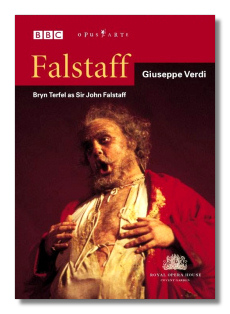
The Internet's Premier Classical Music Source
Related Links
- Verdi Reviews
- Latest Reviews
- More Reviews
-
By Composer
-
Collections
DVD & Blu-ray
Books
Concert Reviews
Articles/Interviews
Software
Audio
Search Amazon
Recommended Links
Site News
 DVD Review
DVD Review
Giuseppe Verdi

Falstaff
- Bryn Terfel (Falstaff)
- Barbara Frittoli (Alice)
- Diana Montague (Meg)
- Roberto Frontali (Ford)
- Desirée Rancatore (Nannetta)
- Kenneth Tarver (Fenton)
- Bernadette Manca di Nissa (Quickly)
- Robin Leggate (Dr. Caius)
- Peter Hoare (Bardolph)
- Gwynne Howell (Pistol)
Orchestra & Chorus of the Royal Opera House, Covent Garden/Bernard Haitink
BBC Opus Arte OA0823D DVD 157min
From the eponymous character's apotheosis to his belly in the first scene to the dazzling choral fugue at the conclusion, this production of Verdi's last opera (his second comic one) is a bucket of belly laughs. Like Orson Wells' film Chimes at Midnight, it is an Falstaffian amalgam of Shakespeare's Henry IV (parts 1 and 2) and The Merry Wives of Windsor; but unlike that work, Verdi's comic creation is one of the most memorable comedies of all time. Its farrago of farce, flirtation, and foibles rarely flags, producing a work of lighthearted entertainment and deep-rooted humanism. Does this production do it justice?
Bryn Terfel reprises a role that has won him so much acclaim. Was he born to play Falstaff or what? Cocooned in latex padding and ludicrous codpiece, he is the braggadocio Falstaff, flaunting his rotund baritone voice in every scene he inhabits. His aria discoursing on the hollowness of honor should inspire you to replay the track for fellow aficionados. His scene with Robert Frontali's Ford is not just a masterpiece of ruse and ulterior motives, it assumes dazzling layers of complexity. Ford's jealousy wars with his desire for comic revenge. Verdi demonstrates this musically by first giving Ford's wily plaints the same bold lyricism that Don Carlos uses describing his amour Elizabeth. Soon the duet with Falstaff about love's fickleness resounds with trills, falsetto outbursts, and comic orchestral echoes. The only scenes that lack liveliness are Nanetta's Queen of the Fairies aria, "Sul fil d'un soffio stesio" and her lover Fenton's aria "Dal labbro il canto estasiato vola." Both are delicate renditions by non-extraordinary singers, but neither piece is memorable. The fault is partly Verdi's: he must have felt he needed "romantic relief." (The Marx brothers made the same mistake in their early comedies.)
Graham Vick's stage direction assaults the eyes with bolts of color and outrageous contraptions, like Falstaff's wine-stained dining table, which more closely resembles a playground device. Vick's interview sensibly explains his loony but effective designs. Terfel's interview could have probed his ideas about Falstaff's character more, but he's charming to listen to. For a live stage production, this Falstaff grabs you by the collar and coaxes you frolic along with it. Most of the time, you can't resist.
Copyright © 2002, Peter Bates


















